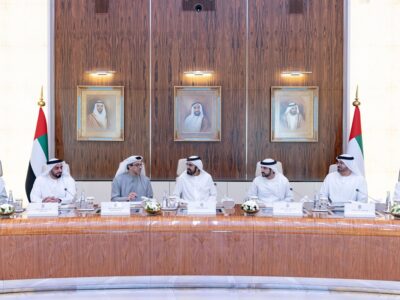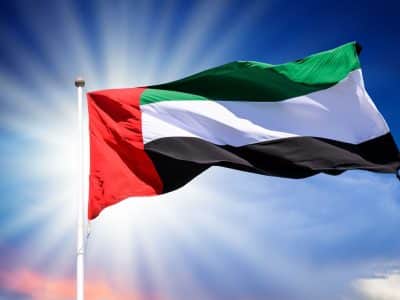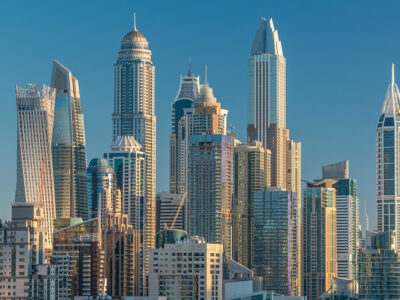There is an old saying in the UK ‘where’s there’s muck, there’s brass’ a simple proverb that illustrates the economic value that can be extracted from the endeavour of keeping things clean, from streets to towns to cities and even nations.
It’s an industry that has always been vital to the running of any economy around the world, get it wrong and there are always consequences. But it’s an industry for all of its importance that has operated somewhat under the radar, after all in times gone by how often did you seriously discuss waste management (if not working in the field)?
But now there is a growing force in the world, a drumbeat that is getting louder as investors and boards finally begin to embrace sustainability, not just with lip service but with real-world action. Thus an industry that started with collection and cleaning and then evolved into recycling now finds itself more relevant than ever before.
UAE leads the way
Here in the UAE, it is also an industry that is reinventing its story to reflect that relevance, pivoting to become a leader in clean energy, in digital transformation, in technology, it’s an industry defined by intellectual property and in-house innovation as much as it is the physical handling of waste.
Leading that charge in the Emirates is a home-grown success born in Sharjah, a company that started in 2007 collecting rubbish, for want of a better word, but which now has the Middle East’s biggest order for Tesla trucks and which is in the process of moving into its futuristic headquarters, one of the last buildings designed by the world-famous Dame Zaha Hadid, solar-powered with energy stored in Tesla power packs.
The company proving that waste, as an industry, is now sleek, digitally smart and environmentally sustainable is Bee’ah.
As evidence of this, its Group CEO HE Khaled Al Huraimel tells Arabian Business of the milestone his company intends to achieve this year, making Sharjah the first in the Middle East to send none of its waste to landfill. Instead, it plans to create a waste-to-energy plant, the UAE’s first such commercial venture. The Emirates Waste to Energy Company, a partnership with Abu Dhabi’s Masdar, will turn non-recyclable waste into power.
“In 2007 we started with our waste collection, contract and landfill management, then we began creating our own facilities to treat waste. We’ve always had that vision of zero waste from the start,” says the GCEO.
“We kept on building that over the years with an integrated approach and today we have 10 different facilities – from construction and demolition recycling to tire recycling facilities, industrial wastewater, and more. The range of facilities has enabled us to reach that diversion rate of 76 percent [waste diverted away from landfill], which is the highest in the Middle East.
“It’s a process and a journey. You have to build the infrastructure, build the different facilities that can take the various types of waste, recover as much of that as possible, and only what you cannot treat or recycle goes to your waste-to-energy facility. Once we reached 76 percent there was not much more we could do. This is why we started building our waste-to-energy facility to take us to zero waste going to a landfill.
“The next step from there is to engineer this huge, 35-metre high landfill. In many countries, they make them into parks but we decided with our sustainability objectives, that we’re going to make it into a solar landfill.
“It’s going to be one of the largest solar landfills in the world, where the surface area on top will have enough space to generate 120 megawatts of power. Just to give you an idea, our waste-to-energy facility creates 30 megawatts and that is enough to power 28,000 homes. Now we’ll have an additional 120 megawatts – a total of 150, all in our waste management complex across a four-square-kilometre site.”
This transformation from waste management to clean energy is just part of the sustainability story. Even at the coalface – street collections – the company’s image is changing rapidly, including the purchase of all-electric Tesla semi-trucks capable of semi-autonomous driving.
“Our city cleaning arm Tandeef, has become the biggest in the UAE and we have the most advanced fleet. All our fleet is tracked and we use optimised routing. And to ensure it’s as green as possible we purchased a large order from Tesla for 50 of its semi-trucks, which is the largest order Tesla has received from the Middle East,” says Al Huraimel.
Another pivot for the company is to consider its future beyond achieving notable goals, such as zero waste to landfill.
“We knew we were on target for that,” says Al Huraimel. “So how do we continue to grow? One way is geographically, and another is to diversify.
“Geographically, we started going to Abu Dhabi, Dubai, and now Saudi Arabia and Egypt. We built in-house expertise that now we can export regionally. With the success of what we did here in Sharjah we have expanded outside the emirate. In Dubai we have waste management contracts with iconic projects including the Dubai airports, the Burj Khalifa, the World Trade Centre, and many others.
 Bee’ah’s headquarters is a model for the region as a renewable powered building
Bee’ah’s headquarters is a model for the region as a renewable powered building
In Abu Dhabi we also have a workforce of 1,000 people, and we recently started working in Ajman, so in the UAE, we are by far the largest player.
“That expertise allowed us to expand outside of the UAE into KSA and Egypt. Last year, we began our operations in the holy city of Medina. That was actually very challenging, but we accomplished it during the pandemic where we were not allowed to travel to Saudi. But, we were able to mobilise 3,000 staff and 500 vehicles in one of the holiest cities in the world in a very short time.
“In Egypt, Bee’ah has been appointed the official waste management and city cleaning partner for the country’s new Administrative Capital. This ambitious urban development project, which is expected to be a vital economic and cultural catalyst for Egypt, will house an expected 6.5 million people on completion.
“But within Sharjah, we’ve covered everything related to waste management, so we started to diversify into other verticals which are still within Bee’ah’s vision of creating a sustainable quality of life. We have been monitoring the quality of air in Sharjah, and we’re also launching the region’s first waste-to-hydrogen project that will include a green hydrogen generation plant and a hydrogen vehicle fuelling station.
“Investing in digital is also key for us, because we felt many years ago, that to sustain our business and growth, we have to invest in digital. If we don’t, we will not survive.
“We believe this is so important that we made it one of our two pillars along with sustainability.”
As part of that digitalisation Bee’ah launched Evoteq in 2017, a division that aims to accelerate digital transformation for public and private entities through consultancy and technological solutions. The company focuses on platform and cloud services, business applications, and smart city and IoT services.
 Bee’ah’s focus on digital infrastructure will sustain its business
Bee’ah’s focus on digital infrastructure will sustain its business
Smart plans
A few key projects they are working on include:
- The largest municipal digitalisation project in the region – the Sharjah City Municipality Digital Transformation Project or SAPEQ.
- Sharjah’s first Tier-3 data centre
- Bee’ah’s OOTF using smart building-focussed solutions
- Developing an advanced Smart Track digital platform to manage end-to-end supply chains across different industries.
- Smart parking in Sharjah
- Smart fleet management systems
In addition, the company’s latest venture is re.life, offering smart platforms which aim to simplify B2B and B2C transactions. Firstly, ‘re.life collect’ connects consumers who have bulky items or waste to move to a verified community of service providers via an Uber-esque app.
And secondly, ‘re.life market’ is a virtual mobile marketplace for business-to-business buying and selling of recovered commodities such as scrap metal, recyclable plastic, mixed fibres, and more.
“What’s exciting for our team is that we’re always thinking of better ways to do things, we don’t stop and we keep going. And whenever there’s an opportunity that we know we can achieve, and it will create a better quality of life, we go for it,” the GCEO continues.
New headquarters
There can be perhaps no greater signpost of the company’s future than its new headquarters, fitting somehow that one of Zaha Hadid’s last projects should be a monument to a more sustainable future.
Designed as two intersecting sand dunes against a natural desert landscape, it pays tribute to Bee’ah’s heritage as a UAE-based company and symbolises its ambitions as the Middle East’s sustainability pioneer.
It will also be one very smart building. “This will be the first fully integrated AI building in the region and we’ve identified hundreds of use cases of AI for how the ‘office of the future’ will operate,” says Al Huraimel. “We’ll have our own persona, like Siri or Alexa, and AI technology throughout the building, so for example, if staff wanted to apply for leave, they can just talk to the building.
“We aim to achieve better productivity and a better work environment, so we’re embracing digitalisation. And we really want to see how far we can go to achieve our vision and our objectives by utilising these tools.”
 Bee’ah is playing a vital role in consolidating the UAE’s position as a global model for sustainable development
Bee’ah is playing a vital role in consolidating the UAE’s position as a global model for sustainable development
Waste-to-energy facts and figures
Bee’ah is currently developing the region’s first waste-to-energy facility, the Emirates Waste to Energy Company’s first project, the Sharjah Waste to Energy plant, in partnership with Masdar. The facility will have the capacity to process 300,000 tonnes of non-recyclable waste per year while displacing around 450,000 tonnes of CO2 emissions annually.
It can generate 30MW of green energy, enough to power 28,000 homes in Sharjah, contributing to the UAE’s clean energy ambitions.
Bee’ah’s waste-to-hydrogen plans
The company is planning a green hydrogen vehicle fuelling station with Chinook Sciences, supporting UAE’s vision in becoming a hub for green hydrogen.
The fuelling station will use green hydrogen generated from the waste-to-hydrogen plant from non-recyclable plastic waste and waste wood. That will be fed into a station to power hydrogen vehicles.
At maximum production capacity, the plant shall be capable of fuelling 1,000 hydrogen-powered large vehicles per day
Bee’ah’s new Zaha Hadid-designed headquarters
Bee’ah’s headquarters is a model for the region as a renewable powered building, with 20 percent of the construction materials sourced from recycled materials from its facilities.
The building is expected to be US Green Building Council LEED Platinum certified – one of the highest accreditations for green buildings – and will be an AI-integrated office of the future.
It will also be powered by renewable energy with an on-site solar plant and Tesla Powerpacks to store energy.
The building’s sustainable technology optimises the use of its resources, resulting in energy savings, water efficiency and lowered carbon emissions.
This includes an AI layer on top of the building management system that optimises consumption and conducts predictive maintenance.
The building also has predictive self-healing capabilities, and will make autonomous decisions to remedy faults, then compensate as necessary by adjusting adjacent equipment.
It will be an intuitive environment that responds to its occupants needs – using AI and smart technologies to regulate lighting and cooling.
The HQ will be optimised for the sustainable use of resources to have zero net energy consumption.





